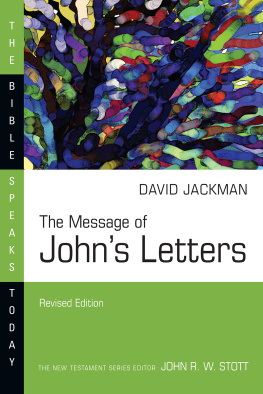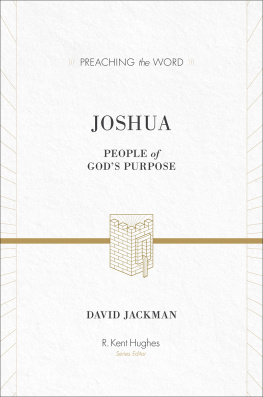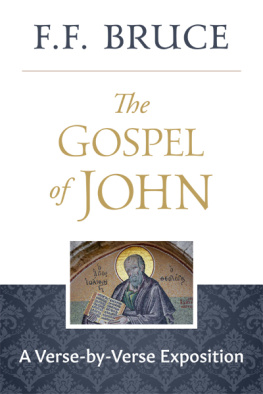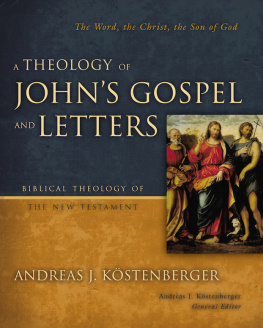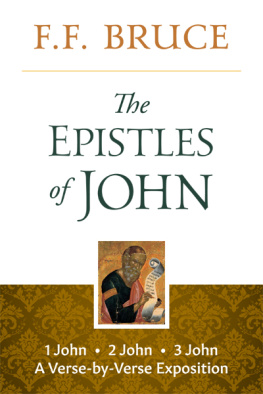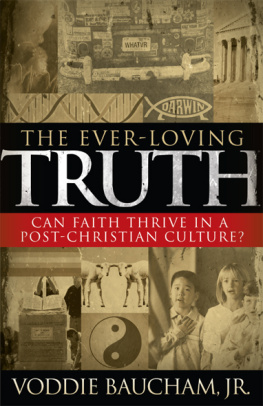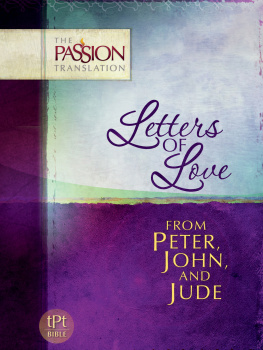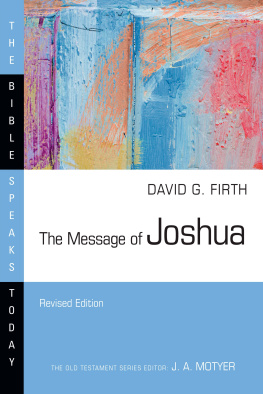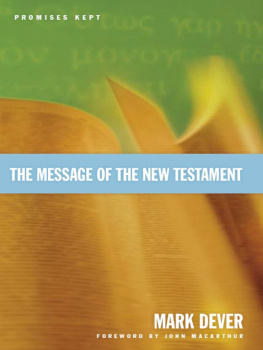av The Authorized (King James) Version of the Bible, 1611.
Bruce The Epistles of John , by F. F. Bruce (Pickering and Inglis, London, 1970).
Candlish A Commentary on 1 John , by R. S. Candlish (1886), in t he Geneva Series of Commentaries (Banner of Truth, 1973).
Clark First John: A Commentary , by Gordon H. Clark (Presbyterian and Reformed Publishing Company, Phillipsburg, New Jersey, n.d.).
jbp The New Testament in Modern English , by J. B. Phillips (Collins, 1958).
Lenski The Interpretation of 1 and 2 Epistles of Peter, the Three Epistles of John and the Epistle of Jude , by R. C. H. Lenski (Augsburg, Minneapolis, 1966).
Marshall The Epistles of John , by I. Howard Marshall, in the New International Commentary on the New Testament (Eerdmans, Grand Rapids, 1978).
neb The New English Bible (NT 1961, 2nd edition 1970; OT 1970).
niv The New International Version of the Bible (1973, 1978, 1984, 2011).
Plummer The Epistles of St John , by A. Plummer, in t he Cambridge Greek Testament for Schools and Colleges (Cambridge University Press, 1894).
rsv The Revised Standard Version of the Bible (NT 1946, 2nd edition 1971; OT 1952).
rv The Revised Version of the Bible (NT 1881; OT 1885).
Westcott The Epistles of St John: The Greek Text with Notes , by B. F. Westcott (Macmillan, London, 1883; republished with Introduction by F. F. Bruce, Eerdmans, 1966).
It was in the autumn of 1982 that I began the adventure of studying Johns letters with the congregation of Above Bar Church, Southampton. On Sunday evenings, for over six months, we climbed the spiral staircase of Johns first letter and marvelled at his exposition of the things that matter most. There is a deceptive simplicity about Johns style. So often the simplest vocabulary is combined with the most profound theology. Ideas that on the surface appear easy to grasp are shown on further investigation to possess ever-increasing depth, as themes interweave and new perspectives open out. After several years of living with John and trying to immerse myself in his message, I have sometimes felt defeated by the magnificence and complexity of it all. Yet, in other ways, I have constantly been encouraged to read the text again, to think it through again and to go on wrestling with the material. Isnt that one of the experiences that makes Bible study so exciting? He has... set eternity in the human heart; yet no one can fathom what God has done from beginning to end (Eccl. 3:11). Johns letters are certainly in that category.
In trying to share Johns message with others, I have been particularly encouraged by the congregations who attended the Keswick Convention Holiday Week in 1983, and in fellowship with the Tenth Presbyterian Church, Philadelphia, USA, with whose Sunday morning congregation I was privileged to share 1 John over the summer Sundays in 1986, when I enjoyed a pulpit exchange with their pastor, James Montgomery Boice. These were wonderful weeks when as a family we experienced such a warm welcome and such a responsive hearing of Gods Word. Truly for us it was a city of brotherly love.
I studied and wrote over a period of five years. The final draft was completed during a period of sabbatical leave from Above Bar in the spring of 1986. I am most grateful to my secretary, Linda Burt, for her patient typing and retyping of the manuscript, to my colleagues on the staff team at Above Bar for their support, advice and encouragement, and also to the editorial staff of IVP for their gentle persistence and valuable editorial functions. It has been a privilege to contribute to the series and I would like to express my sincere thanks to John Stott for his original invitation (so long ago!), and for his patient understanding and generous encouragement to see the work through to completion. I have benefited also from other readers of the manuscript at different stages, who have made valuable suggestions for which I am most grateful.
It is one of the glories of the Bible that whenever you immerse yourself in a particular part, its contents seem to become the most important and urgent message in the world. I have no doubt that Johns letters are a vital and powerful word from the Lord to the contemporary church situation around the world. In a day of polarization to extremes and consequent fragmentation of churches and individual lives, we need to heed his call to hold together truth and love on the basis of Gods self-revelation throughout the Scriptures and especially in this text. It is my prayer that this exposition will help its readers to understand and apply unchanging truth, with genuine Christian love, to the multitude of perplexities, challenges and opportunities we face, as Gods people, in our generation. We dare not be sidetracked by substitutes. Dear children, keep yourselves from idols.
david jackman
If we are going to walk in the light with the God who is perfect holiness, we cannot sit loosely to sin in our own lives. We have already begun to realize that being a Christian calls for a thoroughgoing dedication to the will of God. We must actively enter into all that Jesus has made available to us through his death. We shall show the reality of our faith by obedience to Gods will in every part of our lives. This in turn will strengthen and develop the reality of fellowship with him. Now John makes this same point in a different context, as he shows us that if we are going to love God, we cannot also love the world . The two are mutually exclusive as objects of our love.
We must begin by asking what John means by the world . After all the same Greek word ( kosmos ) is used by John in his Gospel, where he tells us that God so loved the world that he gave his one and only Son, that whoever believes in him shall not perish but have eternal life (John 3:16). Are we not to be like God in demonstrating that sort of compassion? Yet later in this letter we shall find John telling us that the whole world is under the control of the evil one (5:19). It is no wonder that Christians have had very differing attitudes towards the world. Sometimes in the history of the church the emphasis has been upon withdrawal from contact with the world, while at other times the church has been so enmeshed in the world that it has been difficult to see how Christians differed in their lifestyle from the secular society around them.
The fact is that the word kosmos has different shades of meaning in Scripture. Sometimes it stands for the natural world which God has created Planet Earth. This is much the same meaning as in Psalm 24:1, The earth is the L ord s, and everything in it, the world, and all who live in it, although the word kosmos is not actually used here in the Septuagint. The natural world, created and sustained by God, expresses his character in its beauty and splendour. In this creation, humanity has a special responsibility to fulfil the divine mandate to rule over all the earth, and over all the creatures (Gen. 1:26). So the world comes to mean the whole human race, who are both the apex of the created order and, at the same time, Gods vice-regents. This is the world that God loves enough to send his Son to rescue (John 3:16).
But there is another meaning of the world in the New Testament. Sometimes the world is seen as an organized system of human civilization and activity which is opposed to God and alienated from him. It represents everything that prevents human beings from loving, and therefore obeying, their creator. This meaning of kosmos has much the same content as Johns term darkness in chapter 1. The contrast between light and darkness could hardly be more stark. For John this is developed in a series of contrasts, such as truth and falsehood, love and hate, love of the Father and love of the world. That is why verse 15 is such a direct command: Do not love the world . James reminds us that friendship with the world means enmity against God (Jas 4:4). Our contemporary danger is that we tend to water down this radical demand. We think that we can love the world a little bit. After all, Whats wrong with it? The world glitters and sparkles and draws us towards it; and many Christians, as well as those who are seeking Christ, have discovered that the alternative can look so unattractive, stodgy and old-fashioned. Too often the community of Christians can repel those who are genuinely open to Christ because it does not adequately reflect his vitality and love. No wonder people ask, If I do become a committed Christian, isnt that going to be very restrictive and inhibiting? The church can look like a black and white photograph from a bygone age in comparison with the worlds multicolour video presentation. And that problem is not new in the twenty-first century. John wants us to look to Christ and see that he is the one whom we are to be like, for only in him can we find our real freedom. It will help us to understand this if we can grasp what is involved in loving the world.

